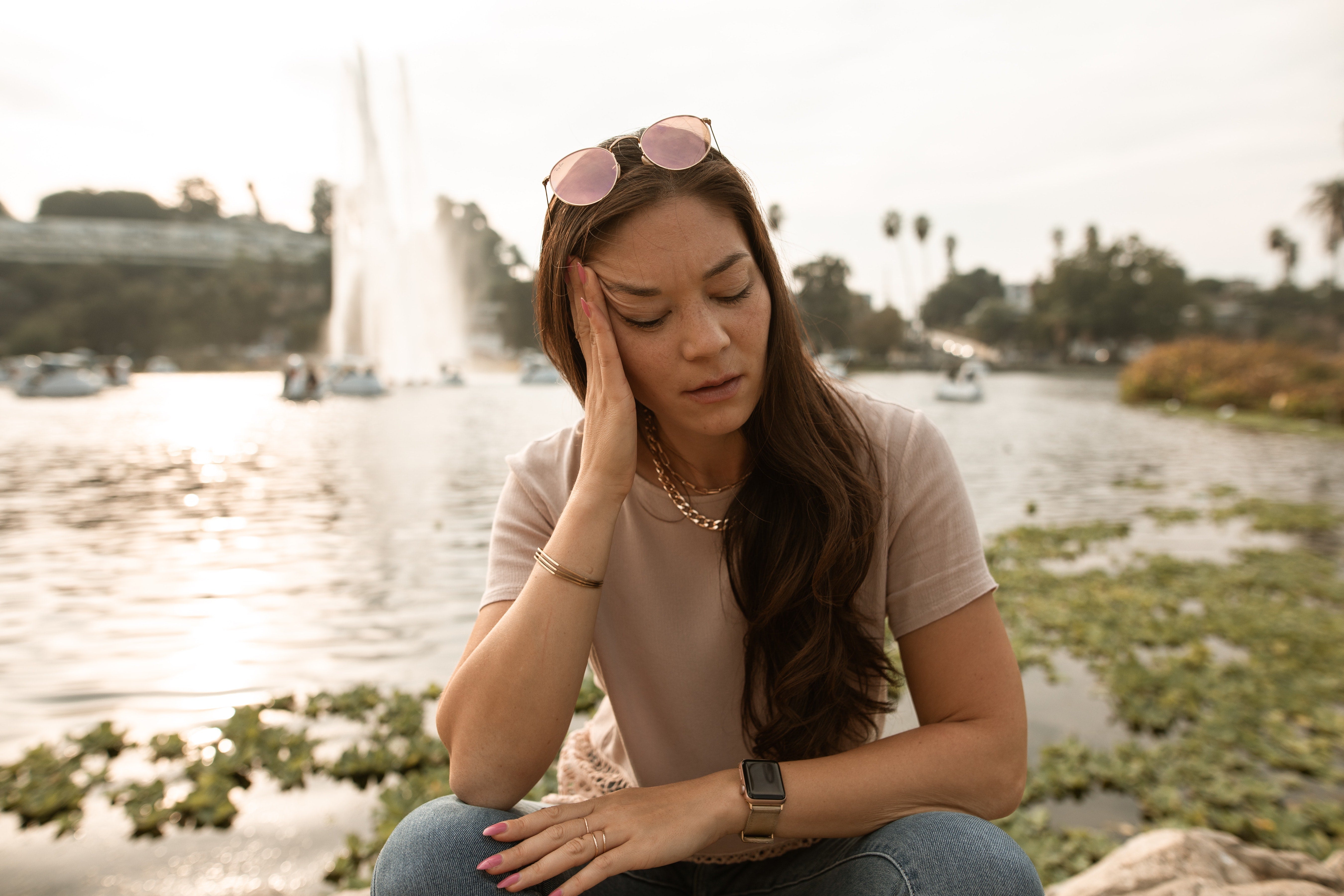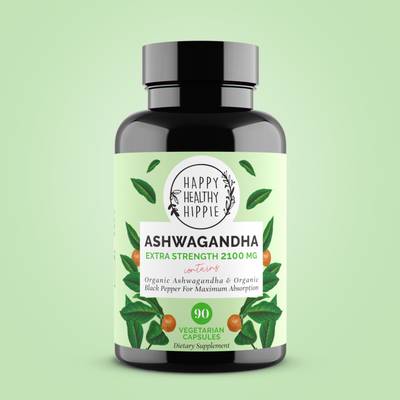
Feeling tired and anxious at the same time seems like a paradox.
However, science is full of neat little contradictions. Experts say that there is a perfect, one-to-one relationship between chronic anxiety and fatigue.
Anyone who has ever experienced anxiety attacks knows how common it is to feel drained and overwhelmed right after an episode of heightened anxiety. They know what it feels like to experience a sudden, rapid heartbeat, a sense of panic, and tight, tense muscles.
On the inside, their blood pressure and heart rate are rising, and the sympathetic nervous system is going into overdrive, releasing toxins in the system, leading to inflammation.
And this relationship extends to adrenal fatigue and anxiety as well. In this article, we’ll explore how your anxiety causes adrenal fatigue and keeps you trapped in a cycle of stress, as well as how to address both issues using natural methods.
What’s Adrenal Fatigue?
Adrenal fatigue comes as a result of prolonged, repetitive stress.
The condition makes your brain and body go into survival mode, and you end up dealing with anxiety, irritability, exhaustion, low energy levels, insomnia, and much more - on a daily basis.
And what’s more shocking is that as much as 80% of Americans go through adrenal fatigue everyday.
Now you’re probably wondering: if it’s such a rising issue, why aren’t we talking more about it?
Part of the problem is that adrenal fatigue symptoms can relate to many other mental and physical conditions, hence the condition is often overlooked or misdiagnosed.
If you have adrenal fatigue, you’re likely to experience:
- Anxiety, irritability, and/or depressive moods
- Difficulty waking up in the morning
- A mid-to late-afternoon energy crash or “slump”
- A second wind where you’re “wide awake” between 11 p.m. and 1 a.m.
- Feeling “burnt out” or physically and mentally run down.
- Constant craving for sugary or salty snacks
- Weight gain (or loss)
- Decreased immunity — you develop illnesses more frequently and/or find it harder to “bounce back” or recover.
- Lower libido
- Insufficient or interrupted sleep (or insomnia)
- Brain fog, memory issues, and difficulty concentrating
Now, the only conclusive way to measure adrenal gland productivity and the hormone levels it’s responsible for regulating is, first, through a blood test.
A more conclusive second step for adrenal fatigue is saliva testing. Saliva hormone testing can reveal biochemical imbalances, which can help healthcare providers identify underlying issues like chronic stress, adrenal fatigue, depression, and more.
The other part of the issue is that quite a few primary care physicians debate the adrenal fatigue diagnosis. While adrenal disorders and insufficiency are a very well-accepted issue in the adrenal health niche, adrenal fatigue tends to raise eyebrows.
However, reading about the doctor who pioneered this diagnosis, Dr. James L. Wilson, can clear things up. It's obvious from his patients' experiences that adrenal fatigue is not just “real,” it’s a treatable condition.
Adrenal health is crucial to our overall well-being. These two, triangular-shaped glands, which sit atop the kidneys, control critical hormones such as cortisol, adrenaline, aldosterone, and norepinephrine.
Together, these hormones:
- Metabolize sugars
- Increase (or decrease) blood flow to the muscles and brain
- Increase heart rate and the force of heart contractions
- Control the waking/sleeping cycle
- Regulate blood pressure
- Keep blood pH levels steady by controlling essential electrolytes potassium and sodium in the bloodstream and urine
The issue behind adrenal fatigue is that if you’re always “on,” or stressed out, the adrenal glands don’t have a chance to return to a state of rest. Instead, like that light switch or your phone, they’re forced to be “on” along with you.
Eventually, like you, your adrenal glands become tired and overworked. They’re not able to keep up with hormonal control and production demands. This leads to further hormonal imbalances, triggering issues like hair loss, skin conditions, depression, and anxiety.
Adrenal fatigue occurs in different stages. Check out our guide to adrenal fatigue stages that can help you determine in which stage you might be in!
Adrenal Fatigue & Anxiety - What You Need to Know
If adrenal fatigue is the “exhausted” epidemic, then anxiety is the “panic” epidemic. As a result of our fast-paced culture and the general stream of negative events worldwide, it can be hard to feel safe, grounded, or in control.
Before adrenal fatigue sets in, you’re living in a state of hyperarousal, which then leads your adrenal glands to become overworked. When you experience anxiety, you’re in that same state of panic and hyperarousal.
So what’s really going on here? Does adrenal fatigue cause anxiety, or is it the other way around?
The connection between adrenal fatigue and anxiety lies in our hormones and stress response.
Let’s take a look:
- Generalized anxiety disorder (GAD) is a common issue in adults. Recently, studies have shown that this disorder is directly linked to over-activity in the “Hypothalamic-Pituitary-Adrenal (HPA) axis.
- The HPA axis is also responsible for regulating and controlling the “stress hormone,” cortisol.
- When we feel fear, alarm, or panic at certain stimuli, whether mental/“imagined” or physical/real, the HPA axis triggers cortisol release by the adrenal glands. This is a part of what we call the “fight or flight” mechanism.
- When anxiety comes into the mix, cortisol levels remain elevated, which then extends anxiety, adds additional stress, and keeps our blood pressure and heart rate elevated.
- Our adrenal glands continue to operate in this state of “panic” or “production,” and cortisol continues to flow and accumulate in the body, which ultimately leads to other serious health issues.
In other words, anxiety and adrenal fatigue go hand-in-hand because of cortisol and our stress response. Every time you feel anxious, your body is kicking the adrenal glands into high gear and releasing cortisol.
That’s precisely why a diagnosis of high cortisol levels and adrenal fatigue have many of the same symptoms:
- Fatigue
- Frequent illness
- Skin issues
- Body aches
- Thinning hair
- Anxiety and depression
- Sleep problems
- High blood sugar
- Difficulty concentrating
Cortisol plays a vital role in both anxiety and adrenal fatigue. That’s why you need to rely on natural and proven methods of keeping cortisol low if you want to heal.
A badly-functioning HPA axis increases the risk of experiencing anxiety and adrenal fatigue. But, left unchecked, it can go beyond these two conditions.
Our overloaded, hijacked stress response, backed by high levels of prolonged cortisol release, has also been linked to other mood disorders like depression and digestive “gut” issues like irritable bowel syndrome.
Alcohol is a possible cause for adrenal fatigue for a lot of people. If you frequently consume alcohol and experience anxiety, check out our informative guide about how alcohol could cause adrenal fatigue.
How to Recover From Adrenal Fatigue
Based on what we know about adrenal fatigue and anxiety, you need to focus on reducing stress, balancing the body, and getting cortisol back to its optimal levels.
Here are five strategies for adrenal fatigue recovery.
#1. Support Your Body With Supplements
When you’re recovering from adrenal fatigue and anxiety, the first thing you need to focus on is feeling calm and relaxed yet energized enough to face the day.
Adaptogenic herbs can help with this by addressing your body’s stress response, anxiety, and cortisol levels.
Some adaptogenic herb supplements that help with adrenal fatigue include:
- Organic Ashwagandha (read more about how Ashwagandha can help with adrenal fatigue here!)
- Rhodiola
- Lemon Balm
- Chamomile
Check out more adrenal fatigue herbs that you might enjoy!
#2. Focus On Your Diet
Eating foods that promote proper functionality of the adrenal glands is one of the best and most natural ways to improve anxiety & stress levels. This type of dieting is similar to most hormone balance diets, meaning it includes foods high in protein, fiber, and vitamins. Specifically, the best foods you can eat to ease adrenal fatigue and anxiety include:
- Leafy greens like spinach, which are rich in magnesium. Studies show that bodies high in magnesium also happen to be low in cortisol.
- Beans and barley, which have phosphatidylserine. This is a phospholipid in cell membranes that counteracts cortisol's adverse effects even if it doesn’t reduce it.
- Seeds and legumes like walnuts and flaxseeds, and fish such as mackerel, haddock, and sardines are sources of Omega-3 fatty acids.
- Adrenal fatigue snacks, such as trail mix, oatmeal with yogurt and berries, avocado toast with egg, hummus, coconut, and more.
Using caffeine as an energy booster might impact your adrenal fatigue. Read our dedicated guide on coffee and adrenal fatigue to learn more!
#3. Incorporate Exercise
When you’re on the road to recovering from adrenal fatigue, exercise can be a great anxiety relief.
It normalizes cortisol levels and boosts feel-good endorphins such as dopamine, serotonin, and oxytocin.
Some exercises you could try include:
- Short (15-30 minutes) of light aerobic exercise
- Walking, light jogging, or even using the elliptical machine
- Yoga and pilates
Known for its use in Ayurvedic healing, Ashwagandha has been used for over 3,000 years to help reduce stress. It does this by:
- Normalizing your stress levels and mood
- Promoting speedier relief from cortisol and adrenal fatigue
- Boosting your immune system with this powerful adaptogen
Try it risk free with our 60-Day Money Back Guarantee.
#4. Manage Stress With Breathwork
Not all breath is created equal.
Practitioners of yoga will be familiar with different styles of breathwork, such as “fire breathing.” This is a technique where you can breathe rapidly, in and out, right into the diaphragm to feel energetic and alert.
Other types of breathing can calm and soothe the nervous system, getting you into a state of relaxation and calm. It usually involves focused, deep breaths, held and released for a certain period, and directed into particular parts of the body.
These techniques calm down your nervous system, lower your blood pressure, heartbeat, and cortisol levels, soothe anxiety, and effectively promote total-body wellness.
If you enjoy using essential oils, check out our selection of essential oils for adrenal fatigue you can use to alleviate your adrenal fatigue symptoms!
Conclusion
There’s one more thing that mood disorders like anxiety and adrenal gland issues like adrenal fatigue have in common. They can often feel like “invisible” ailments. Mental health has always been “hard to spot,” unlike a visible physical injury.
Make no mistake: these are both genuine conditions that can disrupt our lives unless we take measures to protect and heal from them. Now that you know the crucial link between adrenal fatigue and anxiety, you can start your recovery journey the right way.


